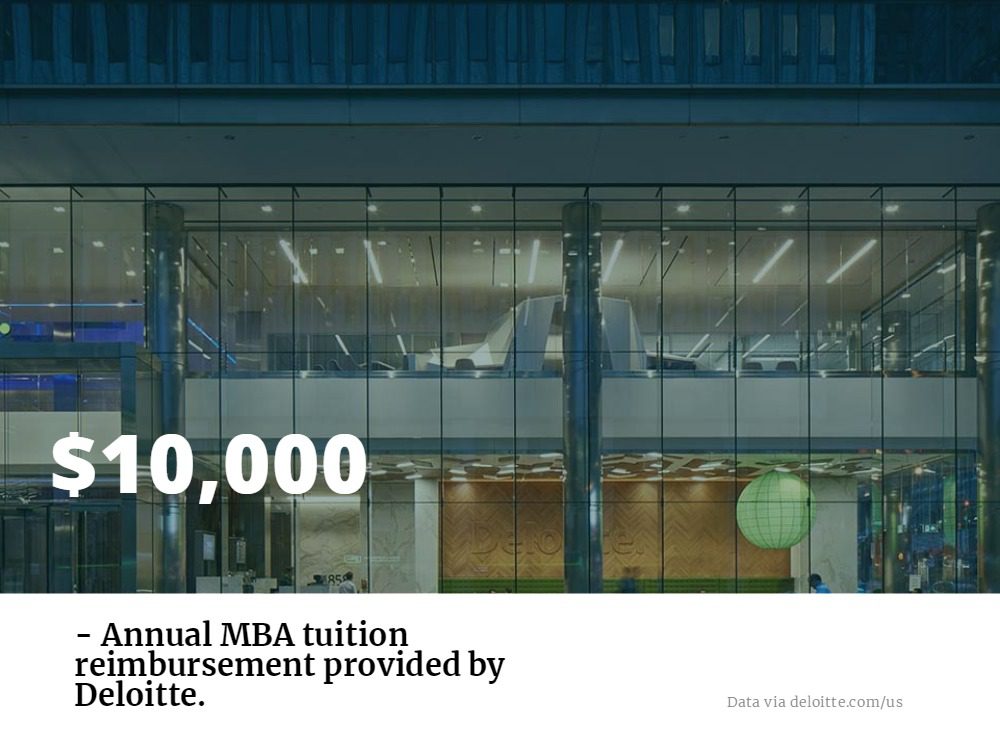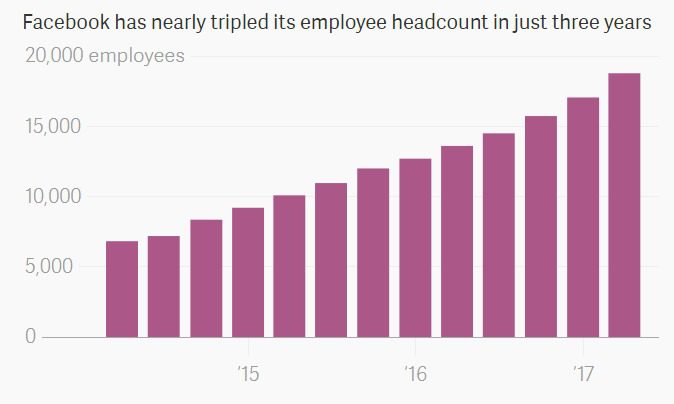How Can You Earn a Career at Deloitte?

In 2017, Deloitte placed 11th out of “Fortune’s 100 Best Companies” to work for. It achieved its top slot thanks to the company’s focus on work/life balance where “you decide how fast paced/slow paced you want to take it.” In fact, 91 percent of Deloitte employees say their workplace is great with:
- Great challenges (96 percent)
- Great atmosphere (95 percent)
- Great rewards (94 percent)
- Great pride (97 percent)
- Great communication (95 percent)
- Great bosses (94 percent)
So, it’s no wonder that Deloitte is a top career choice for many MBA students. The company fits the 33 percent of 2016 post-graduate MBAs who want to work in consulting according to the 2017 Prospective Student Survey conducted by the Graduate Management Admissions Council (GMAC). And Deloitte also falls into the Big Four—KPMG, EY, PwC, and Deloitte—a prestigious place to be.
In addition, Deloitte is a major MBA recruiter with a depth of different career opportunities including Strategy & Operations, not just consulting. According to Transparent Career—a GlassDoor for MBA students—Deloitte ranks as the seventh best consulting company to work for with a composite score of 81/100.
Why You Should Consider Deloitte
So, why should you consider Deloitte as your next career move?
- Culture: For 18 years, Deloitte has been on Fortune’s “100 Best Companies to Work For” list. That indicates consistency.
- Giving Back: Deloitte supports more than 5,000 nonprofits each year through its workplace giving program. Plus, workers gave more than 440,000 volunteer hours in 2016.
- Inclusion: Approximately 2/3 of Deloitte’s new hires were women and minorities, and DiversityInc ranks it as one of the “Top 50 Companies for Diversity” and has done so for 13 years.
Deloitte also pays very well. In fact, according to a recent Business Insider article, Deloitte is ranked as the fifth best paying consulting firm for MBAs. Deloitte Consultants can expect a total compensation package of $221,250. The break down is as follows:
- $25,000 signing bonus
- $149,000 base salary
- $2,500 relocation local or $10,000 relocation out-of-state
- Up to $37,250 in performance bonuses
As for what working at Deloitte is like, according to efinancialcareers, “People say they love working for Deloitte because of its ‘dedicated workforce, dynamic and exciting work environment [with] opportunities for professional growth and advancement,’ as well as its ‘flexibility and mobility’ and ‘interesting assignments.’”

And one current employee described Deloitte as “invested in learning and development” saying that “partners and directors are very approachable” while coworkers are “well-educated and professional.”
Life at Deloitte
What’s a day in the life of a Deloitte new hire look like? It depends on where you work. Deloitte isn’t just a consulting company. MBAs can work in a variety of industries including banking, energy, national defense, real estate, and entertainment and in a variety of functions from mergers and acquisitions to audit and assurance, tax, and financial advisory.
Your career path at Deloitte will depend on where you’re hired. If you’re thinking of a career in management consulting, then joining the Strategy & Operations program as a Business Analyst is a smart move. As an MBA, you’ll start at the senior consultant level for two to three years. From there, you’ll move to manager for three to six years, senior manager for 406 years, and then finally reach principal/director. Within this career path, you’ll help market-leading client organizations tackle their complex business programs to drive results. You’ll be exposed to a variety of industries, clients, and projects.
There are quite a few other options as well. You can join Deloitte as a:
- Senior Consulting in Technology, where you’ll make strategic decisions where technology intersects with business strategy. In this position, you’ll use technology to help companies grow and evolve.
- Human Capital Consultant, where you’ll help clients develop solutions across their enterprise looking beyond human resources.
- Audit Staff Assistant, where you’ll work with a team to navigate the difficult landscape of auditing first-hand.
Depending on your previous experience, MBAs at Deloitte can work in one of eight divisions:
- Audit
- Consulting
- Financial Advisory
- Internal Client Services
- Real Estate
- Risk
- Tax Consulting
- Technology
Landing a Deloitte Career
Landing a job at Deloitte starts with their Deloitte Consulting Immersion Program, Client Service Internship, and various competitions. In each of these programs, MBA students will have the opportunity to interact with higher-ups at Deloitte who are responsible for hiring.
During the internship, MBA students will spend eight to ten weeks working in one of four business functions: risk and financial advisory, audit and assurance, consulting, and tax. On the other hand, the Immersion Program is just three days in length but provides MBAs with the opportunity to evaluate the depth, breadth, and quality of the job opportunities at Deloitte. As for the competitions, the National Case Competition and the National Consulting Case Competition are held at Deloitte University each year—inviting top students from MBA programs around the world.
Still, landing a job at Deloitte isn’t easy. Heidi Soltis-Berner, the Managing Director for talent at Deloitte, told efinancialcareers:
“We’re always looking for the best talent, and we’re pretty selective in who we hire. Overall, our applications were very similar to last year—we got around 500,000, and in the fiscal year 2016 we hired approximately 18,000 individuals, about 50 percent to 60 percent were from a campus setting, which equates to about a 4 percent hiring rate, pretty close to what it was last year.”
Specifically, at the graduate level, Deloitte added 6,400 new hires in 2016—most of those post-internship. According to the Deloitte website, qualified MBA candidates looking to earn a Senior Consultant position should have:
- 3-5 years work experience (preferably in a large company)
- A high level of personal and professional experience and history
- Superior analytical skills
- Willingness to travel
- Leadership capabilities and solid teamwork skills
- Exceptional communication and interpersonal skills
How to Get Your Employer to Pay For Your MBA

Earning an MBA holds tons of value in the business world—an advanced business degree can open doors that may otherwise have been closed, and boasts a high return on investment thanks to the top-level salaries that MBAs command.
Graduate school—and all of the coursework that comes with it—can be an intimidating challenge, but paying for it doesn’t have to be. Aside from scholarship, grant and fellowship opportunities at business schools across the country, more and more companies are placing a higher importance on tuition reimbursement programs, and expanding opportunities for paid MBA tuition reimbursement.
How can you get your employer to pay for your MBA studies? Let’s take a closer look.
Getting Your Employer to Pay For Your MBA
First thing’s first: You need to find out if your current employer offers tuition reimbursement to its employees. The terms of reimbursement vary depending on the company, with some corporations not offering any sort of program at all. Those that do offer some sort of compensation may do so on a course-by-course basis, or as a lump-sum reimbursement package for coursework in relevant degree plans.
“Organizations typically support MBA pursuits for two reasons,” J. Todd Rhoad, managing director of Atlanta’s BT Consulting, told USA Today. “Employee development and succession planning. In the first case, companies support the cost of MBA programs as part of their commitment to employee training and development.”
If you want to convince your employer that your education is worth investing in, you’ll need to show that earning an MBA will further your business acumen and understanding of your industry, and ultimately help your company reap those benefits.
“Usually, an employee has to already been delivering great results within the company,” Roderick Lewis, international relations director at the ISCTE Business School, University Institute of Lisbon, told Business Insider.
“If you haven’t already convinced your company, then asking them to [sponsor your education] becomes really difficult,” Lewis says.
USA Today also outlined a few checkboxes to hit when determining how valuable earning an MBA would be for your organization:
- Do current members of middle or upper management hold advanced business degrees?
- Does your company have the available revenue to invest in employee education?
- Would someone with the type of advanced training you seek bring clear advantages to the company?
If those point hold true in your situation, then start researching which programs specialize in providing the skills that your company needs. Keep in mind: You do not have to limit yourself to business schools in your metro thanks to popularity of Online MBA programs. There may have once been a stigma against online programs, but the of the matter fact is that many of the top online MBAs on U.S. News & World Report’s annual rankings also rank highly on the publication’s top campus-based graduate business programs list.
Some of these schools include:
- University of North Carolina – Chapel Hill (Kenan-Flagler)
- Indiana University – Bloomington (Kelley)
- Temple University (Fox)
- Arizona State University (Carey)
- University of Florida (Hough)
- Carnegie Mellon University (Tepper)
- University of Texas – Dallas
Once you’ve found the right program, you’ll want to craft a brief proposal for your employer. In it, you’ll want to mention how you fit the company’s tuition reimbursement policy, and list the advantages that continuing your education can bring you and your company. Don’t shy away from providing data on how much assistance you may need and how this investment will pay off for everyone, while also ensuring your employer that you’ll remain committed to the company during your degree program, or won’t jump ship after earning your degree.
“A proposal should address the benefit to the company,” Rhoad says, “(including) areas where the company could improve and how you will help them, a review of the courses to be taken and how they will provide knowledge that can help improve the company’s performance.”
Companies That Provide MBA Tuition Reimbursement
Investopedia recently compiled a list of companies have stated that they place a high value on their tuition assistance benefits, and provide tuition reimbursement for the educational costs of an MBA.
According to Investopedia, consulting companies lead the market in tuition reimbursement programs for MBA courses. These firms also pay the highest salaries for MBA alumni. Deloitte has the most robust tuition reimbursement plan, providing employees with up to $10,000 per year in MBA reimbursements. The firm requires two years of work with the company and a commitment to work for the company after graduation in order to receive the tuition assistance benefit.

Financial institutions and banks also place a high value on employees with MBAs, and provide tuition assistance. One example is Bank of America, which provides employees with annual tuition assistance of up to $5,250 for advanced degree coursework. Wells Fargo also has a track record of paying for MBAs, doling out up to $5,000 annually for tuition expenses.
The booming tech sector is also hiring MBAs left and right, with some firms developing their MBA talent in house by offering to pay MBA tuition expenses. Apple tops the list of tech companies offering tuition assistance, providing reimbursement of up to $5,000 annually. MBA degrees are even more coveted in the the specialty defense technology sector, as Raytheon, one of the top defense technology companies in the world, offering to pay up to 100 percent of employees’ college tuition for graduate school.
Other leading companies offering tuition reimbursement to employees include:
- Chevron: A market leader in the energy sector, Chevron offers offers tuition reimbursement of up to 75 percent for its employees.
Ford: Ford’s education tuition assistance program provides employees with tuition reimbursement of up to $5,000 annually for an MBA. - Procter & Gamble: This firm has one of the leading tuition reimbursement benefits in the consumer goods industry, providing reimbursement for up to 80 percent of educational costs with a limit at $40,000.
- AT&T: This telecom giant provides employees with up to $5,250 annually for tuition assistance, for a maximum reimbursement of up to $25,000 for graduate school courses.
So, What is a Strategy MBA and Where Can You Find One?

For those who don’t have a natural knack for strategic thinking, the ability to analyze effectively and make logical decisions can often seem like the kind of skill that just can’t be taught. Luckily, most business schools disagree.
Not only is strategic thinking a skill that can be studied and improved, but an advanced education in this field can lead to a wide array of careers, often incredibly lucrative ones. After all, the ability to make strategic decisions can lead to success in all aspects of business and across numerous industries- that might be why those who earn MBAs in Strategic Management are entrepreneurs, COOs, Department Supervisors, Business Analysts, and are found at any number of high-level management positions.
Whether you are born with the skill or not, pursuing a Strategy MBA is the perfect way to set yourself up for a versatile career in strategic management.
What is a Strategic Manager?
In an ever-changing and often tumultuous business world, an organization’s strategic planner can be a crucial part of their growth and continued success. A career in strategic management or planning will involve keeping an organization on course through the collection, analysis, and organization of information pertinent to the company’s profitability. This may include tracking industry trends, keeping an eye on external business competition or threats, identifying opportunities and creating action plans for a company based on strategic problem solving.
Strategy jobs typically deal in the “big picture” of the company, and are a key part of both shaping and supporting a company’s overall vision and values. The role is a desirable one within a company, as it provides direct access to senior managers and frequently leads to higher level leadership positions.
Strategy jobs require a candidate to use skills from a variety of disciplines, such as finance and marketing. Since these positions are often highly competitive and require candidates to demonstrate a high level of business acumen, earning an advanced degree in strategy is one of the best ways to prove you have the unique combination of skills and drive required for this often demanding—but incredibly rewarding—career.
What Is a Strategy MBA?
Given the breadth of skills required to be a successful Strategic Manager for a company, it’s easy to see why one would want an advanced degree in the field. An MBA specialization in Strategic Management is designed to provide students with a deep grounding within the logic of competitive advantage, focusing on both a broad understanding of business competition as well as a more nuanced training in analysis and decision making.
Offered at some of the top business schools throughout the globe, a Strategy MBA will help set future business leaders on course for careers in strategy consulting, general management, entrepreneurship, and a number of other careers that require the careful skills of analysis and problem solving gained with this degree.
Why Should I Get a Strategy MBA?
With the unique skill set required for a higher-level role in Strategic Management, earning an MBA with a specialization or major in Strategy can be crucial to proving your skill to potential employers. Regardless of your ultimate career goal, the “big picture” type of training offered by a Strategy MBA can be seen as shorthand for a person with the drive and acumen necessary to make crucial business decisions. And graduates with Strategy MBAs don’t always take jobs as Strategic Planners—they are CEOs, entrepreneurs, and other high-level leaders within their organizations.
Those who do earn Strategy MBAs are also often the highest earners among their MBA-holding peers. According to Payscale, Senior Strategy Manager positions can earn salaries of up to $119,000 per year, a large portion of which comes from bonuses, and occasionally, profit sharing. Graduates of Strategy MBA programs are employed at some of the world’s top companies, such as Deloitte, Amazon, and the Intel Corporation.

Where Can You Get a Strategy MBA?
With an increasing demand throughout the years for qualified and experienced strategy planners, a wide variety of business schools—including some of the top ranked MBA programs in the country—have begun to offer MBA specializations in the field of strategy management/planning.
Below are just a few of the MBA programs throughout the United States offering an MBA in Strategy or Strategic Management.
Temple University Fox School of Business
The Fox School of Business at Temple allows MBA students to focus their degree in Strategic Management, or earn a dual degree that combines an MBA with a Master in Innovation Management & Entrepreneurship (IME). The Department of Strategic Management (SGM) at Fox allows students to approach business strategy from four different angles- entrepreneurship, management, consulting, and international business. All for disciplines help prepare students to be leaders within the strategic management field through hands-on instruction, internship opportunities, networking events, travel abroad experiences, and more.
New York University Stern School of Business
The Stern School of Business at NYU allows MBA students to specialize their degree in Strategy, which will help provide a strong business foundation for the business leaders of tomorrow. The degree will help prepare students for a wide variety of fields, including careers in strategic planning, risk management, and management consulting. Courses in strategic management at Stern include: Competitive strategy in the marketplace, corporate governance, strategic design, strategic talent management, and more.
University of Pennsylvania Wharton School of Business
The world-renowned Wharton School at UPenn also offers students the opportunity to earn an MBA in Strategic Management, a major which aims to provide a “deep grounding in the basic logic of competitive advantage premised on a careful analytical treatment of the distinct qualities of positions of individual firms and an understanding of broader competitive dynamics.” Some of the courses offered as part of this major at Wharton include: Deals: the Economic Structure of Transacting and Contracting, Strategic Implementation, Multinational Business Strategy, Competitive Strategy and Industrial Structure, and more
Cornell Johnson LGBT Community Helping Students Succeed

Cornell’s Johnson School of Management recently highlighted several of its LGBT student organizations and fellowships that actively challenge attitudes in the workplace and help LGBT MBAs feel more supported.
The article cites a 2013 Deloitte and Kenji Yoshino study entitled Uncovering Talent, which finds that 83 percent of LGBT employees covered their identities at work, a practice that “decreases employees’ loyalty and commitment to their organization.” Compare this figure to “79 percent of blacks, 66 percent of women, 63 percent of Hispanics, and 45 percent of white heterosexual men.”
“LGBT employees may feel conflicted if they have to lead double lives in fear of being passed over for a job promotion or fired for being who they are. Today, employers in 28 states can terminate workers for self-identifying as LGBT,” explained Reaching Out MBA (ROMBA) Fellow Brian Tsui, MBA ’18.
“People on the outside wonder about your status, and the LGBT person, whether out or not, can be constantly managing their image and behaviors,” adds Ryan Armstrong, MBA ’17.

Photo via Cornell Johnson
In addition to the Out for Business student group, Johnson offers two fellowships in conjunction with ROMBA, a 20-year-old organization that helps students “find sincerely welcoming communities.”
“ROMBA was originally meant to build a stronger network of LGBT peers who would go into well-paid, high-powered jobs, and be able to look after each other as a network,” says ROMBA executive director Matt Kidd.
ROMBA promotes LGBT business school leadership and “provides information about the LGBT status of business schools worldwide, application and job prep and guidance, and conferences and treks to help students find environments that are right for them.”
”I’ve had many doors open because I had an introduction from someone within the LGBT community,” said ROMBA Fellow Sara Johnson, MBA ’18.
Tsui adds, “I found the courage to be proud and vocal after finding support at the annual ROMBA conference. LGBT alumni from MBA programs proved to me that I could be successful in my career and authentic at the same time.”
You can read more about the student organizations at Cornell’s SC Johnson Graduate School of Management here.
Facebook Tops Glassdoor’s 100 Best Places to Work List

Employer review website Glassdoor, which allows users to read anonymous employee testimonials about employers, has revealed its annual “Best Places to Work” list, with familiar MBA recruiters Facebook, Bain & Co, and Boston Consulting Group (BCG) earning the top three spots.
Why Facebook?
Since 2011, the social media empire has been one of Glassdoor’s most praised companies to work for, earning a top five spot seven out of the past eight years, including three number one overall awards. Facebook employees are often given extensive benefits, including four months of paid maternity leave—a policy often considered a luxury in the U.S., which has no legally mandated paternity leave policies for employers. As well, earlier this year, Facebook COO Sheryl Sandberg announced the company would implement paid sick time for employees and family members.
With increasing revenue streams, the company’s hiring numbers have continued to swell, with nearly 19,000 employees as of earlier this year—a 38 percent jump from March 2016 to March 2017. In fact, just this week, the company announced it will be adding 800 more jobs at its new London office.

Data via Facebook, graphic by The Atlas/via Quartz.
Of course, the central pitch to work at the social media monolith may be predicated on the payment of employees. According to Paysa, the average Facebook salary is north of $250,000 annually, combining base pay, bonuses, and equity. Most jobs at the company start at, at least, $70,000 USD annually, with business management roles starting at $135,000.
The company has also made a concerted effort at diversifying its hiring. Speaking with Forbes, Lori Goler, vice president of people, said, “Diversity is critical to our mission at Facebook, because we serve a community of 2 billion around the world, and of course there’s diversity in that community.”
The company, according to Forbes, employs between 33 and 35 percent women, and there has been considerable gains among women employed with computer science and engineering backgrounds, as well as a 500 percent increase in employment among those of African descent since 2014. In the interview, Goler added, “We’re nowhere near where we want to be, but we’re at least hearted to see that at least we can make some progress.”
Check out Facebook’s graduate student recruitment page here.
Consulting Companies Still Reign
While certain statistics indicate a wave of MBA grads may be leaving consulting in favor of tech-centric employers, as evident by the recently released Northwestern University Kellogg School of Management employment report, consulting companies are remain one of the primary targets for MBA students and graduates, and for good reason.
Bain & Co., like Facebook, has been endlessly praised by Glassdoor reviews, ranking among the top four best places to work every year since 2009. Like most of the companies on the year-end list, Bain offers ample benefits, including several months of paid maternity leave, comprehensive vacation and insurance policies, and one of the world’s best 401K offers. Fellow Boston metro company BCG also officers a considerable parental leave benefits package, retirement planning, and lofty salaries.

Inside the New York City BCG office/Photo via BCG.
Like Bain, BCG makes a concerted effort to bring in incredibly comparable MBA graduates, recruiting students from multiple prominent business schools like The Wharton School, NYU Stern, Columbia Business School, and many more.
Some Traditional Companies Remain Steady, While Giants Like Apple Stumble
Tech empire Google, not surprisingly, held its place among the top 10 companies—having never fallen lower than eighth overall since 2012. Just outside of the top ranking companies, McKinsey & Co. stayed within the top 20, while other notable heavyweights like Microsoft (39th), Capital One (69th), Deloitte (77th), Accenture (83rd), and Apple (84th), the world’s most successful consumer company, fell to the lower ends of the list.
Despite having the second most profitable year in company history, falling shortly behind it’s 2015 figures, Apple has been steadily dropping down Glassdoor’s annual Best Of list, posting its worst standing in the history of the ranking—nearly 50 spots worse than last year’s ranking of 36th overall.
Considering, however, that the annual ranking is comprises of over 500,000 companies, this drop may not be as serious as it would appear. The overall Glassdoor rating for Apple was 4.3, in contrast to Facebook, which boasts a current 4.6 rating. The average Glassdoor rating for employers, for context, is 3.3.
Some Surprises
Not every company included in the Glassdoor Best Of list could be considered a traditional MBA recruiters, including beloved U.S. west coast fast food chain In-N-Out Burger (fourth overall), growing athletic leisurewear empire Lululemon (sixth), wine company E. & J. Gallo Winery(14th), Delta Airlines (17th), and The Church of Jesus Christ of Latter-day Saints (19th), which provides “Excellent dental and medical coverage,” according to an anonymous employee. Plus, “you work with people who don’t swear.”
For a more extensive overview of the methodology behind the ranking, click here.
Hot Jobs for MBAs: Becoming a Pricing Analyst

MBA graduates looking to apply their skills to a fast-growing and high-paying career may be interested in pursuing a role in Pricing Analysis. Named among the 100 best jobs in America by CNN, working as a Pricing Analyst is a perfect way for an MBA graduate to make use of their strong education combining skills in marketing, finance, and analytics.
With a predicted 10-year job growth of 41.2 percent and roughly 280,000 total jobs available, business students who think they might be interested this fast-growing career can start preparing while still in school through specialized study in marketing or finance. Armed with the special skills in data analysis in addition to the strong business background of an MBA, students looking to enter the field after graduation will have a competitive advantage as they begin their career.
We’ve rounded up the most important things to know about a career in Pricing Analysis to help you decide if it’s the right role for you.
What is a Pricing Analyst?
A company’s pricing analyst is responsible for figuring out the appropriate price for a business to place on a product or service. Using a variety of data and different metrics, the Pricing Analyst will determine the perfect price that will both appeal to consumers and produce an appropriate profit for the company.
Pricing Analysts must be able to track marketplace trends and implement a strategy that will benefit both the company and consumer. Someone in this role must be able to effectively communicate to a number of other departments such as supply chain, sales, marketing, finance, and be able to work with these groups in making pricing recommendations and decisions based on their analysis.
Pricing Analysts may be needed at wide variety of companies and organizations, ranging from construction companies, colleges and universities, banks and financial institutions, pharmaceutical companies, and more.
What Skills Does a Pricing Analyst Need?
Those who succeed in the role of Pricing Analyst typically have strong skills in mathematics, analytical thinking and problem solving. It is also important that Pricing Analysts are able to effectively communicate, as they are often required to explain their research and analysis to others in order to make important decisions.
Other skills employers may seek in a Pricing Analyst may be:
- An interest and skill working with numbers and data.
- Being a detail oriented and proactive worker.
- Have the ability to work with minimal supervision.
- Experience in back-office and billing systems and database management programs,
Pricing Analyst Salary
Pricing Analyst salaries, according to PayScale, may vary according to a number of factors, such as education, terms of the job, and type of employer. On average, Pricing Analysts can earn anywhere from $52,000-61,000 depending on their level of experience. In cities like New York and Boston, that number is slightly higher.
A recent study from Deloitte found even more impressive figures: 62 percent of respondents in a survey of pricing professionals reported salaries of greater than $100,000 and 83 percent of respondents said they were also eligible for an annual bonus.
EVEN MORE MBA JOBS: Verizon is on the Lookout for MBA Students and Grads
MBAs For Pricing Analysts
While most MBA programs do not offer a direct concentration in pricing analysis, a number of programs still provide specialized pricing education through other departments, like finance and business analytics. Below are just a few examples of pricing-related courses available at some of the top MBA programs in the country:
-
Scheller College of Business – Georgia Institute of Technology
The Scheller College of Business offers a course in pricing strategy as part of their Business Analytics MBA concentration. The course, marketing Analytics and Pricing Strategy, helps students gain skills in making effective pricing decisions through the understanding of important economic and analytical concepts associated with customer behavior and competition.
-
The Wharton School – University of Pennsylvania
FNCE717, or Financial Derivatives, at the Wharton School focuses students on making strategic corporate decisions, particularly when it comes to pricing. Students will learn several different approaches to pricing and how to apply such skills for investment and risk-management.
-
Rutgers School of Business, Newark and New Brunswick
The MBA program at Rutgers’ Newark and New Brunswick location offers a class in Supply Chain Pricing Strategy. The course recognizes the importance of pricing in driving profits and the extreme negative impact poor pricing decisions can have. Students will learn how to approach pricing from both a strategic and tactical level and be able to apply it to a number of fields and industries.
Do You Actually Need an MBA for the Job?
While an MBA is not necessarily a requirement of all Pricing Analyst jobs, it is by far the most common degree held by those in this role. According to the aforementioned Deloitte survey, 43 percent of respondents held MBA degrees, while just 26 percent—the next highest percentage—held undergraduate degrees in business. Earning an MBA and demonstrating specialized coursework in pricing will give those in the field a competitive edge and open the door to higher level management positions in the field.
